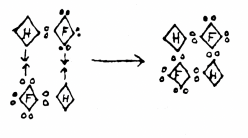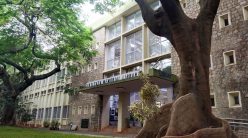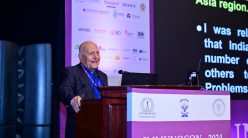The following piece is an edited excerpt from the unpublished autobiography of Robert MW Travers, the son of Morris Travers, IISc’s first Director. Locked in a tussle with JN Tata’s sons over his plans for IISc before he travelled to England on leave in 1910, Morris Travers sensed that having a wife would enable him to make more social contacts in India, and had decided to return a married man. While in England, Travers was introduced to Dorothy Gray, a girl from a wealthy family. He proposed immediately, and the very next day, she accepted. In just a few weeks, they were wed.
* * *
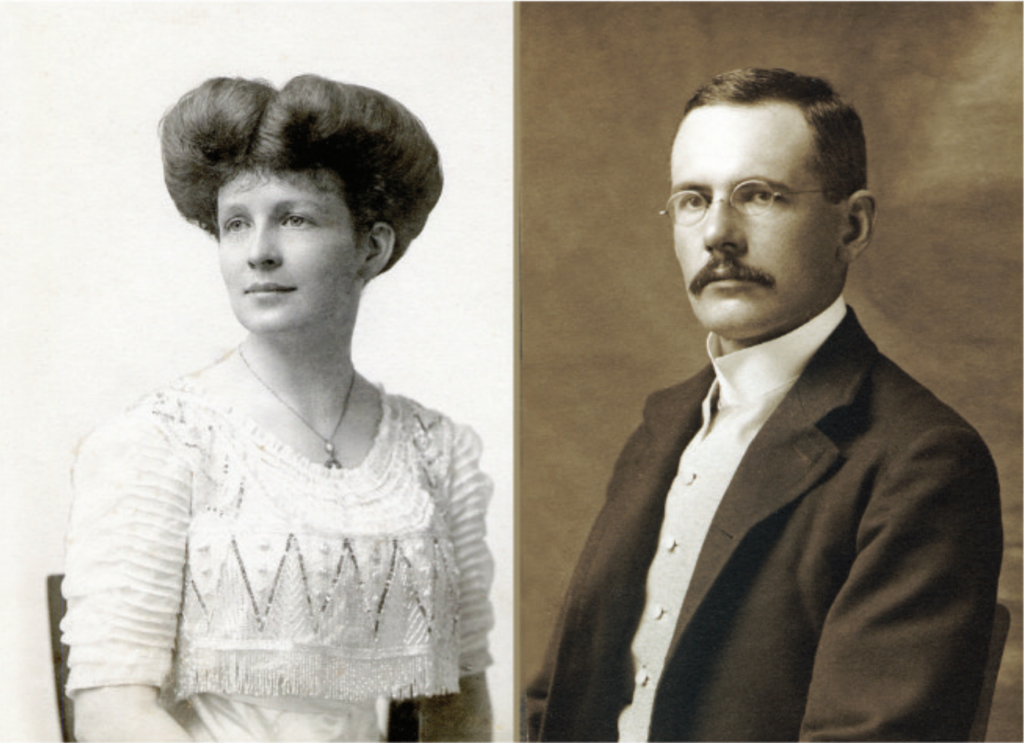
The couple had planned a country honeymoon of two or three weeks, but on the third day my father received an urgent message from India saying that powerful political forces were at work to remove him from his job. The honeymoon came to an abrupt end. The bride’s beautiful trousseau was hastily crammed into suitcases. The hotel rapidly harnessed a horse to the guest shay* and bundled the couple and their luggage into a train which would take them back to London. They arranged accommodation on the first mail boat to Bombay. In those days, affluent passengers to India never boarded the boat at the London Docks but took the train across France and Italy, boarding the ship at Brindisi and cutting two days off the trip. The boat they planned to board had already left London at the time of booking, but they were able to catch it by taking the overland route.
The dash across the European continent occupied two days and nights in the train. Each must have tried to appear cheerful but each must have known the deep anxiety the other experienced. Then they spent ten days on a boat, isolated from all news that might have told them more about the crisis that had precipitated the race to India. The boat was hot. Those able to make advance reservations had taken all the cabins on the shady side of the ship, so that all that were left at the last minute were the star-board cabins into which the tropical sun blazed all day long. I can only judge from how I saw my parents react to stress in later years, how they must have reacted to each other on this voyage. I can imagine them being very quiet, talking little, with my mother always playing a supportive role but in a very subdued way.
One can hardly believe that it was just luck which led my father to pick a wife who had all of the qualities he lacked. Undoubtedly, he saw in her the characteristics that made a wife acceptable. She was an entertaining conversationalist. She could talk about music and literature. She spoke fluent French and German, which gave her an entrée into scientific society. She had a marvelous sense of humor and could tell a story in the most refreshing way. It was almost as if she were on the stage. She could do this partly because she had a great capacity to empathize with others and partly because she had natural talent for acting. Indeed, in another age she might have become a great actress.
This couple who embarked on adventure together could not have been more differently endowed. His magnificent, cold, logical intellect contrasted with her intuitive, warm, and artistic capabilities. He was well-read in the sciences but had little use for great literature, but she felt that a day without deriving inspiration from a poem or from some passage of literature was a day that was wanting. He could talk well but was a poor listener, but she could both talk and listen.
Often, strange circumstances draw couples together, and nothing strengthened the bond between my parents more than the fact that Father was in deep political trouble. Mother always had feelings for anyone in trouble. In Father’s autobiography, written 40 years later, one of the few human touches is found in his statement: “I went and told D all about my problems.” He had probably never had a confidante, and the relationship not only enriched his life, but made his problems endurable.
The couple also made an effort to present an air of confidence to the social world in which they mixed. They moved into the new residence provided by the Institute and began to give magnificent receptions. It was not uncommon for them to invite 100 or more to an evening reception on the grounds where a military band would entertain the guests, and the native cooks who were virtuosos in their art provided the finest food. Mother blossomed into the role of hostess. Unfortunately, her appearance on the Indian scene was just too late to reverse the tide of conflict within the Institute’s administration.
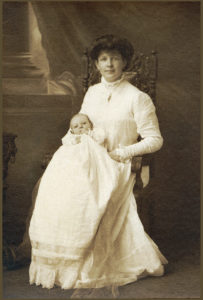
My sister and I arrived in the midst of this period of turmoil and torment. Hardly surprising it is that in Father’s autobiography he mentions the arrival of his daughter in just a single paragraph. He simply did not mention my arrival.
Although the crisis in India was a product of Indian politics, it was one which a person with my father’s disposition did not easily handle. He reacted to such crises with anger rather than with political shrewdness.
When the honeymoon was cut short by a cable from India, Father must have realized much had gone wrong in Bangalore during his absence. What had happened was that some members of the Council had taken the opportunity provided by his absence to take steps to remove him from his position.
The strategy of the Council, designed to remove the Director, was a product of the times in India. Bribery and corruption permeated the system. Perhaps even a majority of prosperous citizens were guilty of participating in the bribery system. A charge of financial corruption must have seemed to the Council a sure way of getting rid of the Director. What they did not realize was that the Victorian gentleman might be a man of many vices, but the Council had picked one vice to which he was not prone. The Council did not understand the English culture, just as the Director did not understand the Indian culture. To charge the Director with financial corruption was as ridiculous as charging the Pope with making advances, in public, to young women. The Council and the Director belonged to two different worlds and neither understood the world of the other.
Father was furious that anyone should doubt his integrity. If his relationship to the Council had been cold up to this point, it now turned white-hot. The Court held an inquiry which proved the charges unfounded, but the Court could settle only the issues brought before it and could not resolve the deep incompatibility of the Council and the Institute’s Director.
Although I have told this story in few words, the events dragged out over a period of several years. In their home life, Morris and Dorothy Travers were drawn closely together sharing their misery. In his public life, my father was able to proceed with work on the development of the buildings of the Institute. Most of the essential structures emerged out of the jungle. Students slowly filled the laboratories and classrooms, and several of these early students went on to have distinguished careers. Whatever Father could not do, he was materially successful in accomplishing his goal of building the kind of institute he wanted.
After the attempt to take Father to Court had failed to result in his removal, a period of cold war lasting several years resulted. Members of the Council who had opposed the policies of the Director must have been somewhat chagrined that the Institute was becoming a success. The Institute was able to attract many students of high intellectual caliber and also some who were not so able. The less able students became an issue of dispute between the Council and the Director. The Council believed the students were not receiving a fair shake. The Director called for the dismissal of some of the students unable to meet the academic standards. Eventually the Director settled the matter in a politically shrewd manner. He eliminated the students from the program but gave them positions as laboratory assistants in which they could behave competently. The issue became just one more example of tension and bickering within the Institute.
Morris Travers sought solace in the only way in which he knew. He began to undertake work in the laboratory, though I have often wondered how a man running a large institution could find time to do so. However, he did have competent junior members of his staff capable of carrying on the daily functions. Escape into the laboratory gave him the feeling of being in a place where he was sure of his ability to handle all contingencies. Perhaps he may even have had dreams of recapturing some of his prestige as a laboratory scientist, a prestige which in time had slowly eroded in the memories of his colleagues in the scientific world. The new scientific work he did manage to undertake was sound, but it had none of the brilliance of his earlier efforts. Its main value to him was to enable him to withdraw from the strains of administrative life and the torture of the conflict between himself and the Council, which also needed a period of respite from deep and emotion-filled conflict.
In the year 1913, the Council began to search for ways of coming to terms with the problem. They approached the Director concerning the conditions under which he would leave the Directorship. The terms could have been arrived at easily and without debate, but they involved much bickering. He had received his initial appointment in 1907 for a period of ten years, but the last two years were to be a paid vacation, and he was to receive a pension for life. By simply extending his terminal vacation, the Council was able to ensure his departure. After considerable argument, this is what the Council and the Director eventually agreed upon as a solution to their differences. In the summer of 1914, Morris Travers and family returned to England.
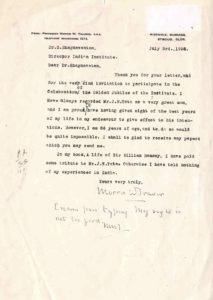
Two postscripts must be added to this account of Morris Travers’ Indian venture. The first postscript is that in 1957, the registrar of the Institute sent Father a set of pictures of the Institute. One of these was a picture of a new and magnificent building. Underneath the picture were the words “Economics and Social Science Building”. The picture must have been a terrible blow to Father, for it seemed to him a monument to the opposing side’s victory and his own defeat.
A second postscript is that the bitterness of the experience left a permanent scar on his life. He believed that he had sacrificed a scientific career by going to India and by turning to administration. He believed he had been succesful but that his success as an administrator had not been recognized. India left him with a bitter taste that lasted the remaining fifty years of his life. Even worse, he became highly sensitive to what others might say about his success or failure in India. There were times when he had deep suspicions that some people had a one-sided view of what had happened to him in India and that it was not the side he would choose for them. He collected newspaper cuttings and other materials about the Institute to search for recognition of his contribution. He wrote a long autobiography, nearly half of which covered the problems he encountered in India, but his time there had occupied less than one-tenth of his life. Despite surface confidence in his success at the Institute, he had a haunting fear that he might not have been entirely right in India, and it was that fear that he never learned to live with or accept.
*chaise – a light horse-drawn carriage
